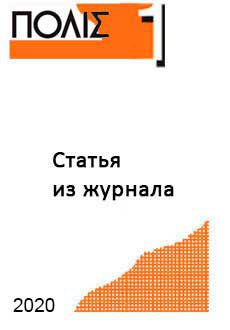Online shop of "Polis. Political Studies" Journal
We in the world, the world in us
Konnov V.I. Science Policy Programs: a Paradigm-Based Analysis. – Polis. Political Studies. 2020. No. 1. P. 9-21. (In Russ.).
Free!
science policy, scientific community, strategy of science and technology development, political sociology of science.
The article offers an analysis of the conceptual sources of science policy, and the modern dynamicsof its changes in program documents adopted by Russian executive authorities in the period from 1996to 2016. The theoretical basis for the analysis is Kuhn’s methodology, with particular emphasis placed oncomponents such as distinguishing paradigms based on their incommensurability, and identifying paradigmaticdocuments that serve to form a common vision of reality as shared by a particular community. In relation tothe formation period of modern science policy of the 1940-60s, two paradigms stand out – liberal and Marxist.The origin of the first is associated with support for research and development in the United States during andafter the Second World War; the second is instead associated with the policies of the Soviet Union in the1920s-1960s. The evolution of Soviet science policy starting from the 1960s followed the path of adopting thesystems theory; this is the reason why it is more accurate to characterize it as a systems paradigm. This line ofdevelopment was cut short in the early 1990s in connection with a sharp turn to the liberal paradigm,clearly manifested in documents of this period. However, in the 2000s, there was a return to systemsvision. Now, the documents of the current decade are shifting to a new neoliberal paradigm, which isbased on the notion of market organization as the main mechanism of governmental management, andwithin which autonomy for the scientific community is replaced by its organization according to marketprinciples. At the same time, the 2016 Strategy for Scientific and Technological Development onceagain addresses the elements of the systems paradigm, trying to combine both elements of contractualorganization of scientific research, which is one of the main components of the neoliberal vision, anddirect management, which naturally follows from the systems approach. Paradigm analysis thus points to an internal contradiction inherent in Russian science policy, which complicates its implementation.
 English
English Русский
Русский

Reviews
There are no reviews yet.